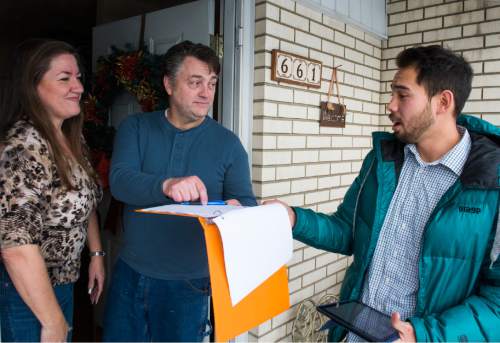This is an archived article that was published on sltrib.com in 2016, and information in the article may be outdated. It is provided only for personal research purposes and may not be reprinted.
Utah's signature-gathering path for candidates to get on the ballot may not be dead yet.
U.S. District Judge David Nuffer did not rule Monday on the contention by the Utah Republican Party that the number of signatures needed to get on the ballot was so high as to be unconstitutional.
But he did seem more open to the possibility in a hearing than he did earlier this month, when he expressed concern about the standards.
Nuffer had asked attorneys for the GOP and the state to brief him on why the signature threshold — 1,000 for state House candidates and 2,000 for state Senate candidates — are not substantially harder to meet than past Supreme Court precedent allows.
The answer, Assistant Attorney General David Wolfe said Monday, is that gathering signatures is an option. While the challenge may be steep in some districts, candidates can still seek the party's nomination by going through the traditional route of courting delegates at the party convention.
Adding the signature path expanded access to the ballot, Wolfe argued.
"Its frosting on the cake," Wolfe said after the hearing. "It's extra access to the ballot, and courts have addressed this very issue. As long as states provide reasonable access, extra access is that much better. I guess the state Legislature could have a 99 percent [signature] threshold" and it would be valid.
Christ Troupis, the lawyer for the Utah GOP, disagreed. Troupis cited a Supreme Court ruling striking down portions of the Voting Rights Act because the historic wrongs Congress sought to eliminate were not based on current data.
Under SB54, a Republican running in one Democratic district would have to get signatures from 57 percent of registered GOP members to make it onto the ballot. Several districts require more than 30 percent.
"It is no different than a coin flip," Troupis said, "because if you are lucky enough to be in a district with a high number of registered Republicans, you don't have much work to do."
Wolfe contended that "the proof is in the pudding," and the fact that nearly 60 candidates have already gathered enough signatures to qualify for the ballot proves it's not an excessive barrier.
"Some of the most powerful evidence that access to the ballot has been expanded is that candidates have jumped over this hurdle time and time again," Wolfe said.
Troupis countered that just because candidates have been able to meet the signature requirements, "doesn't mean that it's rational."
Nuffer did not delve into the issue of what the consequences might be if he were to strike down the signature thresholds — as he suggested in his March 4 order.
In an email late Saturday, the state appears to have reframed the issue for the judge.
"It appears the existence of the convention path to the ballot may be decisive, if the signature gathering requirements … are not 'wholly irrational,' " Nuffer wrote to lawyers in the case.
Discussion of how to adjust the signature-gathering requirements would be "wholly unnecessary," he wrote, "if we do not reach their constitutionality because access to the ballot exists through the presumably constitutional convention process."
The judge said he expects to issue a ruling in the next month, before a scheduled hearing on April 15. The parties are also scheduled to argue before the Utah Supreme Court on April 4 over the issue of whether the candidate can choose to gather signatures, go the convention route or both, or whether the party gets to choose how candidates have to seek the nomination.
The Republican Party says it can choose the path and its candidates have to go to the party convention.
In that hearing, the Democratic Party will also argue that if a party doesn't let candidates gather signatures, it should be disqualified as a recognized political party.
Utah Democratic Party Chairman Peter Corroon, whose lawyers supported the state's argument, said it sounds to him like Nuffer is leaning against the Republican Party, which really compounded the problem by refusing to let the state's more than 600,000 unaffiliated voters sign petitions.
Twitter: @RobertGehrke TRIB TALK
Top Utah lawmakers discuss the 2016 Utah Legislature
O 12:15 p.m. • On Tuesday, Utah House Speaker Greg Hughes, R-Draper; Senate President Wayne Niederhauser, R-Sandy; and Senate Minority Leader Gene Davis, D-Salt Lake City, join Jennifer Napier-Pearce to talk about which bills passed, which didn't and what's on the agenda for next year. Watch this online video chat at sltrib.com. You can also join the discussion by using #TribTalk on Twitter and Google+ or by texting 801-609-8059.



